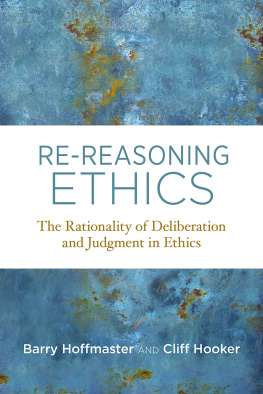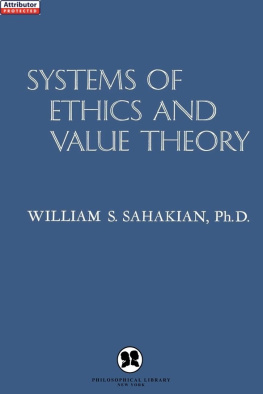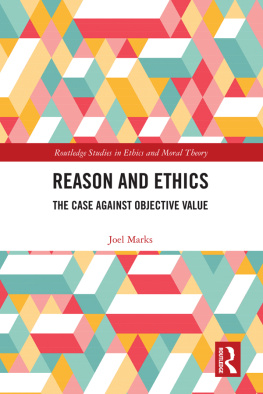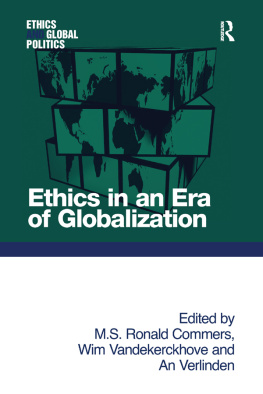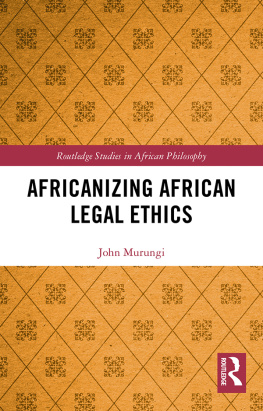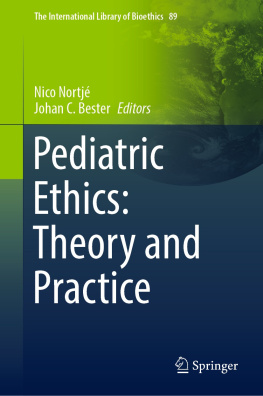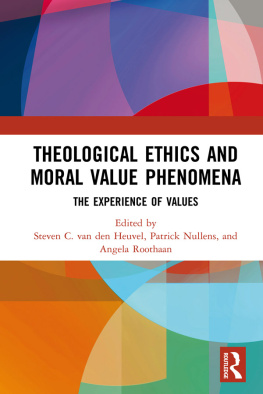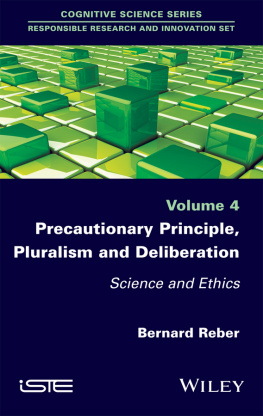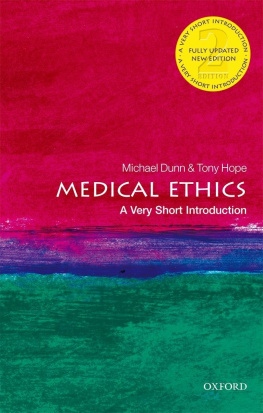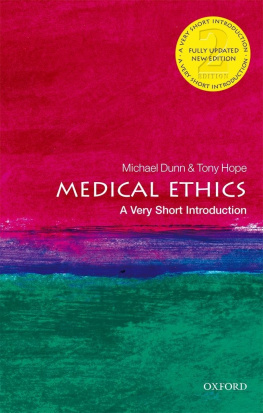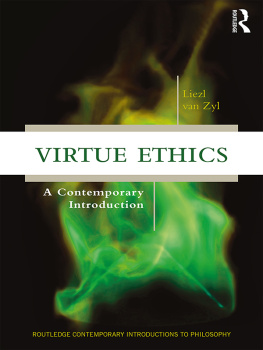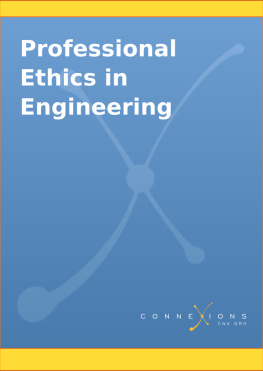Hoffmaster Barry - Re-Reasoning Ethics: The Rationality of Deliberation and Judgment in Ethics
Here you can read online Hoffmaster Barry - Re-Reasoning Ethics: The Rationality of Deliberation and Judgment in Ethics full text of the book (entire story) in english for free. Download pdf and epub, get meaning, cover and reviews about this ebook. year: 2018, publisher: MIT Press, genre: Romance novel. Description of the work, (preface) as well as reviews are available. Best literature library LitArk.com created for fans of good reading and offers a wide selection of genres:
Romance novel
Science fiction
Adventure
Detective
Science
History
Home and family
Prose
Art
Politics
Computer
Non-fiction
Religion
Business
Children
Humor
Choose a favorite category and find really read worthwhile books. Enjoy immersion in the world of imagination, feel the emotions of the characters or learn something new for yourself, make an fascinating discovery.
- Book:Re-Reasoning Ethics: The Rationality of Deliberation and Judgment in Ethics
- Author:
- Publisher:MIT Press
- Genre:
- Year:2018
- Rating:4 / 5
- Favourites:Add to favourites
- Your mark:
- 80
- 1
- 2
- 3
- 4
- 5
Re-Reasoning Ethics: The Rationality of Deliberation and Judgment in Ethics: summary, description and annotation
We offer to read an annotation, description, summary or preface (depends on what the author of the book "Re-Reasoning Ethics: The Rationality of Deliberation and Judgment in Ethics" wrote himself). If you haven't found the necessary information about the book — write in the comments, we will try to find it.
Hoffmaster Barry: author's other books
Who wrote Re-Reasoning Ethics: The Rationality of Deliberation and Judgment in Ethics? Find out the surname, the name of the author of the book and a list of all author's works by series.
Re-Reasoning Ethics: The Rationality of Deliberation and Judgment in Ethics — read online for free the complete book (whole text) full work
Below is the text of the book, divided by pages. System saving the place of the last page read, allows you to conveniently read the book "Re-Reasoning Ethics: The Rationality of Deliberation and Judgment in Ethics" online for free, without having to search again every time where you left off. Put a bookmark, and you can go to the page where you finished reading at any time.
Font size:
Interval:
Bookmark:

Re-Reasoning Ethics
Basic Bioethics
Arthur Caplan, editor
A complete list of the books in the Basic Bioethics series appears at the back of this book.
Re-Reasoning Ethics
The Rationality of Deliberation and Judgment in Ethics
Barry Hoffmaster and Cliff Hooker
The MIT Press
Cambridge, Massachusetts
London, England
2018 Massachusetts Institute of Technology
All rights reserved. No part of this book may be reproduced in any form by any electronic or mechanical means (including photocopying, recording, or information storage and retrieval) without permission in writing from the publisher.
Library of Congress Cataloging-in-Publication Data
Names: Hoffmaster, C. Barry, author.
Title: Re-reasoning ethics : the rationality of deliberation and judgment in
ethics / Barry Hoffmaster.
Description: Cambridge, MA : MIT Press, 2018. | Series: Basic bioethics |
Includes bibliographical references and index.
Identifiers: LCCN 2017038168 | ISBN 9780262037693 (hardcover : alk. paper)
Subjects: LCSH: Ethics. | Bioethics. | Medical ethics. | Judgment (Ethics) |
Reasoning.
Classification: LCC BJ1031 .H74 2018 | DDC 170/.42--dc23 LC record available at https://lccn.loc.gov/2017038168
ISBN: 978-0-262-03769-3
EPUB Version 1.0
Contents
Preface
This ethics book is unique. Its content is different and distinctive. It is not about the moral theories that are taught in philosophy courses and written about in philosophy journals. (We use ethics and morality interchangeably.) Moral theories are comprised of principles, and moral reasoning is taken to consist of applying those principles to the facts of problems to deduce right answers. The descriptions of problems are brief, and the resolutions that are logically derived are necessary, certain, and universal. That theoretical depiction of ethics is attractive, but it is too simple, too spare, and too abstract. Telling the truth, for example, can be a challenge. You adhere to principles of telling the truth and preserving life, but you encounter a situation in which lying is needed to save a life. What is the right thing to do? Abide by the principle that prohibits lying or abide by the principle that prohibits killing? Which is the right moral principle, and why is it the right moral principle? More generally, how is the right moral theory to be determined?
This book is about real moral problems that are complex, contextual, and dynamic, how these demanding problems are framed, examined, and settled, and how those analyses, constructions, and resolutions can be rational. The conception of ethics presented here is unusual because it is empirical and naturalistic. Examples of moral issues are taken from research in anthropology and sociology. But how can such a depiction of ethics be normative? By recognizing what orthodox moral philosophy ignores: moral judgment. Determining which principles, values, and facts are relevant requires judgment; resolving conflicts between principles and values requires judgment; and applying general concepts to particulars requires judgment. Judgment is ubiquitous in our lives, and ethics is no exception. The normativity of ethics inheres in good judgment, and good judgment emanates from well-designed, rational processes of deliberation. This book is about nonformal reason, a more expansive conception of rationality that is different from and independent of the formal reason of logic and mathematics and that suffuses our lives. Re-reasoning ethics is about forming rational processes of deliberation that produce rational judgments. That is the best that finite, fallible human beings can do.
This book is the culmination of a decades-long collaboration between two philosophers in different fields, one who specializes in bioethics (BH) and the other who specializes in philosophy of science (CH). The common enterprise is not surprising, however, because both the rationality of bioethics and the rationality of science is the nonformal reason that fosters good judgment.
The book has two parts. The first part, Ethics and Reason, develops the unrecognized nonformal reason that instills a different, augmented rationality into ethics. It is presented by example and by showing how the resources of nonformal reason operate in science, a paradigm of rationality. The second part, Ethics as Design, explains how moral compromise and a liberated, extended, and enriched reflective equilibrium are used in designing ethical decision making and how deliberation, practices, institutions, and policies are designed. The contents of the chapters are summarized below.
Chapter 1. Introduction. Women who are at risk of having a child with a genetic condition were interviewed about how they deliberated about whether to try to get pregnant. This research provides a real, illuminating example of decision making. The womens genetic counselors believed that the women should decide by applying the principle of maximizing expected utility to their situations. The women disavowed that approach. Instead, they imagined scenarios of what it might be like for them and their family to live with an affected child, and they assessed their reactions to those scenarios. For moral philosophy, by contrast, applying principles is the rational way to decide. Beginning with this example, this book will explain how the deliberation these women undertake is quintessentially rational.
The next two chapters show that the logic-based approach of formal reason creates parallel problems in ethics and in science.
Chapter 2. The Difficulties of Applied Ethics. Real cases are used to show that there is much more to ethics than reaching decisions based on deduction from principles and rules. Because the meanings of crucial terms in norms, such as euthanasia and autonomy, are indeterminate, they have to be clarified and specified. When principles and rules conflict, how is the one that prevails to be determined? What makes a problem a moral problem, and what does being a moral problem mean? After nonformal reason is introduced in chapter 4, chapter 5 discusses how it can manage several of the cases presented in chapter 2.
Chapter 3. The Problems Generalized, Diagnosed, and Reframed in a New Account of Reason. The problematic features of moral situations revealed in chapter 2 have exact counterparts in scientific research. Given that, it is not unreasonable to expect them in every domain. Their appearance in science makes it especially clear that the problem is located in the common conception of reason as logic that currently underlies both ethics and science. To prepare the way for examining the nature of an appropriate rational procedure, chapter 3 surveys the received Western tradition of characterizing rationality formally; then it explains why this conception of rationality cannot handle serious problems and why a radically different approach is required. The natural framework for addressing these matters is a philosophical naturalism that recognizes that humans are fundamentally finite and fallible but possess a powerful ability to learn. This start refocuses rationality around intelligent problem solving.
The following two chapters develop a nonformal conception of rationality, first for science (where the issues are more cleanly drawn) and then more broadly.
Chapter 4. The Problems Resolved in a New Account of Reason. Deliberative judgment formation, or simply judgment, is a core human skill that is largely irreplaceable by rational formalisms. Indeed, it is required to create those formalisms. Judgment is rationally learnable and improvable like other skills; and, like all intelligent creatures, humans need abundant practical experience with contextual problem solving for judgment formation to be sufficiently relevant, attentive, perceptive, and judicious to support intelligent problem solving. Equally telling for the role of judgment, even in learning about our norms, is that norms and normative methods have been massively elaborated historically in both science and ethics as experience has been gained, as is characteristic of knowledge and skills that have to be acquired by the human species through learning. Rationality can itself be learned and improved through experience in problem solving, for example, in the way an experienced lawyer powerfully marshals precedents and analogies. The same self-improvement characterizes an increasingly powerful scientific method, the spread of institutional ethical resolution processes, and so on.
Font size:
Interval:
Bookmark:
Similar books «Re-Reasoning Ethics: The Rationality of Deliberation and Judgment in Ethics»
Look at similar books to Re-Reasoning Ethics: The Rationality of Deliberation and Judgment in Ethics. We have selected literature similar in name and meaning in the hope of providing readers with more options to find new, interesting, not yet read works.
Discussion, reviews of the book Re-Reasoning Ethics: The Rationality of Deliberation and Judgment in Ethics and just readers' own opinions. Leave your comments, write what you think about the work, its meaning or the main characters. Specify what exactly you liked and what you didn't like, and why you think so.

